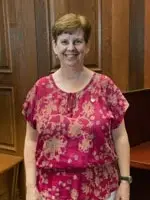Perhaps one of the foremost reasons to be a special education teacher is the chance to positively impact the lives of children with disabilities, developmental delays, and learning disorders. When children who have developmental disabilities—or are at risk for them—receive early intervention, they show positive changes in health, language and communication, cognitive development, and social and emotional development.

Education: Special Education (Pre-K to Grade 12)
WHY STUDY SPECIAL EDUCATION AT CHC?
Our Special Education program is designed with 21st century teaching and learning in mind and built on a tradition of excellence that dates to 1924 when Chestnut Hill College was founded by the Sisters of Saint Joseph.
CHC’s programs are accredited through the Pennsylvania Department of Education (PDE) and governed by the General Standards of Chapter 354 of the Pennsylvania Code. All Teacher Education majors must be aware of specific PDE course requirements throughout their program of study. Students must pass required state assessments for teacher certification.
Positions are currently available in the following settings:
- Private schools which offer specialized curricular, usually connected to a specific philosophy
- Parochial schools which offer specialized curricular woven with specific faith teachings
- Public schools, including Charter schools which offer curricula aligned to state and national standards, with many varieties of organizational structures
Our partnerships with public, private and parochial schools in surrounding urban and suburban school districts offer students a rich tapestry of classroom teaching experiences. Chestnut Hill College education programs require students to begin as observers, advance to teaching lessons two half-days a week, and then take charge of a full classroom of students. These classroom environments increase the opportunities for our majors to gain valuable real-world experience. In fact, it’s not uncommon for a student teaching experience to lead to a full-time employment upon graduation.
Field Experience I and II
Field Experience Stage I and II are a student’s initial pre-clinical field experiences and consist of 40 hours (20 hours per semester). For many candidates who desire a teaching certificate, the Pre-Student Teaching experience may be their first opportunity to be in a school setting in a capacity other than as a student. Field Experiences I and II allow the teacher candidate to observe and participate in the teaching process while taking courses in human growth and development, learning theory, and methodology. The expectation for these experiences is that all theoretical understandings will be reinforced and broadened by the opportunities to connect with the school environment.
Field Experience III
Field Experience Stage III A/B provides the teacher candidate with opportunities to interact with children and teachers in various settings and to participate in all aspects of the classroom program. This Pre-Student Teaching Field Experience placement typically takes place in the junior year. Students are assigned as part of a cohort and a CHC supervisor is assigned to the school as an instructional coach and liaison from the college. CHC teacher candidates are placed in a classroom (major specific) for six hours per week (75 hours are required per semester). The Stage III field experience is designed to prepare the teacher candidate for the final experience, Stage IV Student Teaching.
Student Teaching (Stage IV Field Experience)
Student Teaching (Field Experience Stage IV) is the capstone field experience. Teacher candidates are carefully placed in schools and thoughtfully matched with a highly qualified mentor teacher for fourteen weeks. Candidates follow the schedule of their mentor teacher and are expected to be in the classroom full time. The mentor teacher, with support from the CHC supervisor, guides the candidate to gradually assume full teaching responsibilities for two weeks. Candidates are evaluated based on Pennsylvania Department of Education (PDE) competencies. Candidates that meet PDE competencies and have passed the PECT or Praxis certification tests required for their major upon graduation may apply for Pennsylvania teacher certification.
Kappa Delta Epsilon
Kappa Delta Epsilon is an honorary professional society, the purpose of which is to promote the cause of Education by fostering a spirit of fellowship, high standards of scholastic attainment, service, and professional ideals among its members. Requirements include an overall GPA of 3.00 or higher, Junior status, and formal acceptance into the Education Department. Eligible students must be approved by the Department.
Council for Exceptional Children
Membership in the Council for Exceptional Children is open to all Education majors and minors. The Council provides students with opportunities to become knowledgeable with the latest research on the educational needs of children with disabilities, to foster a spirit of educational fellowship and to provide service to students, schools, and organizations working in the areas of special education.
-

Lauren M. Barrow, Ph.D.
Chair, Center for Education, Advocacy & Social Justice Associate Professor of Criminal Justice
-

Marie Leahy, SSJ, Ed.D.
Chair, Undergraduate Education Associate Professor of Education
-

Leonard Spearing, Ph.D
Assistant Professor of Education
